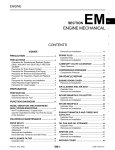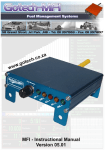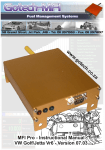Download MEASUREMENT IN TROUBLE DIAGNOSIS
Transcript
MEASUREMENT IN TROUBLE DIAGNOSIS April 2008 Foreword The information in this Training Manual should not be interpreted as a basis for warranty or goodwill claims against Nissan Motor Co. (Australia) Pty. Ltd. (NMA) unless so designated. This Technical Training Manual is intended for use by NMA & Nissan Dealership Technical Personnel. It is not designed for the use by press or for customer distribution. Before quoting any specifications be sure to check the relevant Service Manual and Technical Bulletins. Right for alteration to data and specifications at any time is reserved. Any such alterations will be advised by Nissan through Technical and Sales Bulletins. ©2008 Nissan Motor Company (Australia) Pty. Ltd. Inc. Victoria Ref: Technical Training Department. Measurement in Trouble Diagnosis. Nissan Australia April 2008 MEASUREMENT IN DIAGNOSIS Measurement of Pressure for Trouble Diagnosis When diagnosing vehicle concerns, various measurements of pressure are often taken. There are two types of pressure that we commonly refer to: • Gauge pressure (ranging from atmospheric pressure upwards) • Absolute pressure (ranging from a complete vacuum upwards). Zero Gauge Pressure Zero Absolute Pressure Negative Pressure Complete Vacuum 100 kPa Positive Pressure Atmospheric Pressure 60 kPa 0 kPa Manifold Vacuum - petrol @ idle 350 kPa Fuel Pressure - petrol 1,200 kPa 3,100 kPa Compression Pressure - petrol Compression Pressure - Diesel 180,000 kPa Common Rail Diesel injection pressure Note: Not to scale Gauge Pressure This is relative to atmospheric pressure and is most commonly used in system diagnosis. Absolute Pressure This is measured from a perfect vacuum through to positive pressures. This is less commonly used except for example when measuring intake manifold vacuum. Vacuum A pressure of 0 kPa G (Gauge) is equal to 100 kPa A (Absolute). However, when referring to vacuum (from atmospheric pressure), the readings increase in kPa to 100 kPa at a perfect vacuum. This is actually a negative pressure (- kPa) but is usually just expressed as kPa of vacuum. 1 Measurement in Trouble Diagnosis. Nissan Australia April 2008 MEASUREMENT IN DIAGNOSIS Measurement of the Fuel Pressure (Petrol Engines) As part of an Engine no / poor running diagnosis, the Fuel Pressure is an important measurement to record in order to narrow down the cause of a fault. Measuring Fuel Pressure will measure the pressure that the fuel is under prior to entering the injector. Obviously the Fuel won’t spray properly if the pressure is incorrect (too low). Also, the amount of fuel entering the combustion chamber will be insufficient if the pressure is too low (Fuel starvation). If the Fuel Pressure is too high, then the engine will have a rich running / excessive fuel consumption issue Fuel system tests are: • Pressure • Residual Pressure Retention Ensure there is sufficient fuel in the tank before conducting tests. Fuel Pressure Release On all systems, it is important to safely release residual fuel pressure before removing fuel hoses. • Perform “FUEL PRESSURE RELEASE” with CONSULT II in Work Support Mode. Ensure that engine stalls and will not restart. • Without CONSULT II, remove the fuel pump fuse, run the engine until it stalls and ensure that it will not restart. WARNING: Great care must be taken to avoid fires when opening the fuel system. Fuel Pressure Test on Return Systems 1. Install the Fuel Pressure gauge on the engine. Refer to Section EC – “Basic Service” in the Service Manual 2. Switch Ignition ON. Ensure Fuel Pump activates & then stops after a few seconds. Check for fuel leaks. 3. Start engine and read fuel pressure. Compare to specifications in the Service Manual. Check the following items if fuel pressure is too Low: • Blocked filter or fuel pump pick up • Restricted fuel lines • Faulty pressure regulator. Intake Manifold Pressure Fuel Damper Pressure Regulator Note: • If fuel pressure is LOW, carefully squeeze the return line (resulting in blocking it) & watch a sharp & rapid increase to approximately double the normal Fuel Pressure spec. Only do this for a maximum of 3 seconds. If the pressure increase does occur the fuel pressure regulator is faulty. If not, either the level of fuel in the tank is low, the fuel pump output is weak, a fuel line is blocked or the fuel filter is blocked. • If fuel pressure is too HIGH, either the pressure regulator is faulty or the return line is restricted. 2 Fuel Pressure Gauge Fuel Filter * Not all models Fuel Return Fuel Pump (Filter and Sender Unit) * Not all models Fuel Tank Measurement in Trouble Diagnosis. Nissan Australia April 2008 MEASUREMENT IN DIAGNOSIS Fuel Pressure Test on Return-less Systems 1. Install the Fuel Pressure gauge on the engine. Refer to Section EC – “Basic Service” in the Service Manual 2. Switch Ignition ON. Ensure Fuel Pump activates & then stops after a few seconds. Check for fuel leaks. 3. Start engine and read fuel pressure. Compare to specifications in the Service Manual. Injector Rail With Injectors Fuel Damper Check the following items if fuel pressure is too LOW: • Blocked filter or fuel pump pick up • Restricted fuel lines • Faulty pressure regulator. Note: • DO NOT SQUEEZE OR CRIMP FUEL LINES! • If fuel pressure is too HIGH, replace the pressure regulator which is located in the fuel tank. Fuel Tank Fuel Pump (Filter and Sender Unit) Pressure Regulator (Pre-set, non variable) Fuel Return Residual Pressure Retention (Both types of Fuel Systems) Ensure that when the engine & fuel pump is switched OFF, fuel pressure is retained in the lines for the specified period. Typically this should be no more than a 10% drop over 10 seconds. If pressure is dropping away excessively, consideration needs to be given to the following items: • Leakage in the reverse direction back to the tank. • Leakage in the forward direction through leaking injectors (or fuel pressure regulator on Return Systems only). If this is the case, the engine will be difficult to start & black smoke will be emitted from the exhaust. Typical SST requirements for Fuel Pressure Testing Adapter KV 101118400 Adapter KV 10117600 AUS Gauge and Adapter 7211 and 7273 Fuel Line Removal Tool 16441 6N210 3 Measurement in Trouble Diagnosis. Nissan Australia April 2008 MEASUREMENT IN DIAGNOSIS Measurement of Compression in the Cylinder Chamber As part of an Engine no / poor running diagnosis, the Cylinder Compression is an important measurement to record in order to narrow down the cause of a fault. Correct engine compression is a critical factor in good engine operation, good fuel consumption and providing clean emissions. Actual compression pressures will vary depending on the type and condition of the engine. Typical range of compression pressures: Engine Compression kPa Max variation between cyls. Cranking RPM Std Minimum Petrol – VQ40 1,275 981 98 300 Diesel Indirect Injection – TD42 2,942 2,452 294 200 Diesel Direct Injection – ZD30 2,942 2,452 294 200 Diesel Direct Injection – YD25 3,100 2,500 490 200 Compression Test Procedure (All engine types) Engine MUST be at operating temperature. Ensure battery condition will enable correct cranking speed (monitor with CONSULT II). Use jumper battery if necessary. If the compression is below specifications: • Check valve clearances • Conduct wet-test (small qty. of oil added to Low cylinder): • If compression increases, suspect rings/piston problem • If compression remains same, suspect valves/cylinder head. • If two adjacent cylinders remain Low, suspect head/gasket problem. Petrol Engines 1. Remove fuel pump fuse, crank engine a few times to ensure engine won’t start 2. Remove; manifold collector (if required), ignition coils and spark plugs 3. Insert compression gauge 4. Switch ignition ON and depress accelerator pedal fully NOTE: The Electronic Throttle (if fitted) will open with ignition switched ON. 5. Crank engine and after gauge stabilises, RECORD compression readings for each cylinder. 4 Measurement in Trouble Diagnosis. Nissan Australia April 2008 MEASUREMENT IN DIAGNOSIS Diesel Engines 1. Ensure engine is warmed thoroughly & then switch engine OFF. 2. Refer to section EM or EC of the Service Manual for correct pump or fuel system disabling procedure. NOTE: On YD25 engines - remove injector connectors and carefully isolate with insulation tape. (Refer to Service Manual Update Bulletin EM06-001). 3. Remove Glow Plugs (ensure dirt cannot enter engine and glow plugs are not knocked around) 4. Insert correct compression gauge adaptor for the engine. NOTE: Engine can be permanently damaged if incorrect compression gauge adaptor is used. 5. Crank engine and after gauge stabilises, RECORD compression readings for each cylinder. Diesel Engine SST’s for checking Compression Refer to the right for the different glow plug hole adapter tools required for measuring compression on diesel engines. NOTE: Take care not to use the wrong adapter. Otherwise severe engine damage will result. Petrol Engines Use any commercially available tools for checking compression on petrol engines. YD25 Engine ED19600610 ZD30 Engine ED19600620AUS (DO NOT use in YD engine or severe damage will result) TD Engines ED19600600 5 Measurement in Trouble Diagnosis. Nissan Australia April 2008 MEASUREMENT IN DIAGNOSIS Measurement of Oxygen Content after Combustion All modern petrol engines have Oxygen Sensors installed in the exhaust manifold. These sensors generate a voltage signal & sends this voltage back to the ECM. A varying amount of Oxygen seen by the sensor will create a varying voltage signal. The ECM sees this varying voltage & then it MAKES AN ASSUMPTION ON HOW MUCH FUEL ENTERED THE COMBUSTION CHAMBER. If the Oxygen Sensor (O2S) measures a HIGH level of Oxygen; This will tell the ECM the A/F Ratio was LEAN. Therefore on the engines next cycle the ECM will add MORE Fuel. If the Oxygen Sensor (O2S) measures a LOW level of Oxygen; This will tell the ECM the A/F Ratio was RICH. Therefore on the engines next cycle the ECM will add LESS Fuel. Small Amount of Fuel (LEAN) This condition will create a situation where the A/F mix will have a short burn time. There is not enough fuel to make a long burn time. Since the small quantity of fuel has quickly burnt up, the burning will stop & there will be a certain amount of Oxygen remaining amongst the exhaust gases. These gases are expelled out the exhaust valve, the O2 Sensor samples these spent gases & there it will see this remaining O2 content. This will create a voltage signal which indicates to the ECM that the amount of fuel that was sprayed out of the injector was a small amount, therefore next cycle it will increase the injection rate. Large Amount of Fuel (RICH) This condition will create a situation where the A/F mix will have a long burn time. There is now more fuel to make a longer burn time. Since the larger quantity of fuel makes a longer burn time, nearly the entire O2 content will burn. The spent gases left over in the combustion chamber will contain very little if any O2 content. These gases are expelled out the exhaust valve, the O2 Sensor samples these spent gases & there it will see that there is hardly any remaining O2 content. This will create a voltage signal which indicates to the ECM that the amount of fuel that was sprayed out of the injector was a large amount, therefore next cycle it will decrease the injection rate. 6 Measurement in Trouble Diagnosis. Nissan Australia April 2008 MEASUREMENT IN DIAGNOSIS Ideal Air Fuel Mix (14.7:1) The right amount of Air to Fuel will result in an ideal burn. IDEAL 14.7:1 LEAN by Short Injection Duration (Excess of Air to Fuel) The injector is opened for a short period of time by the ECM. Only a small amount of fuel enters the combustion chamber. This results in a short burn time, therefore some O2 content will be left over after the burning has stopped. This left over content of O2 is expelled & then seen by the O2 sensor. This signals to the ECM that the mix was lean, therefore will result in an increased rate of injection (more fuel) for the next cycle. SMALL INJECTION QUANTITY LEAN by Fuel Starvation (Injection Duration OK) (Excess of Air to Fuel) Due to low fuel pressure / blocked filter / blocked injectors etc, this results in a short burn time due to the lack of fuel. This again results in some O2 content being left over. This left over content of O2 is expelled & then seen by the O2 sensor. This signals to the ECM that the mix was lean, therefore will result in an abnormal increase in the rate of injection for the next cycle in order to compensate for the “lack of fuel” condition. 7 FUEL STARVATION PROBLEM Measurement in Trouble Diagnosis. Nissan Australia April 2008 MEASUREMENT IN DIAGNOSIS LEAN by Intake Air Leak (un-metered air) (Injection Duration OK - Excess of Air to Fuel) Due to an air leak on the intake (leaking intake manifold gasket, hole in air intake tube etc.) the MAFS sensor only measures a certain amount of air This signal is sent to the ECM, therefore the ECM adds a specific amount of fuel which is relevant to the amount of air measured. Air which is leaking through a hole or a leaky gasket is added to the combustion chamber with an insufficient amount of fuel. Combustion takes place but there is left over O2 in the exhaust gases & therefore is seen by the O2 sensor. This signals the ECM to increase the injection rate above what it thinks is normal. INTAKE AIR LEAK AIR LEAKS!! False LEAN Signal due to Exhaust Leak (Injection Duration OK. Air/Fuel Ratio normal) REMEMBER! If the O2 sensor sees Oxygen, it means LEAN! Therefore if O2 leaks into an exhaust manifold due to a cracked exhaust manifold or a leaking exhaust manifold gasket, the false O2 content will make the ECM increase the injection rate – EVEN IF THE INJECTION RATE WAS PERFECT! EXHAUST MANIFOLD LEAK False LEAN Signal due to Spark Missfire (Injection Duration OK. Air/Fuel Ratio normal) REMEMBER! NO spark means NO burn. Even if TOO MUCH fuel entered the combustion chamber, if it doesn’t burn, neither does the O2 content. Unburnt O2 means LEAN! As a result the ECM increases the injection rate to add more fuel to an engine that doesn’t need anymore fuel. 8 X NO SPARK Measurement in Trouble Diagnosis. Nissan Australia April 2008 MEASUREMENT IN DIAGNOSIS RICH (Normal Air Quantity with Excess Fuel) If there is an excess amount of fuel added (leaking injectors or excessive injection duration etc.), not all of the fuel will burn because in this case the burning will stop due to all the oxygen being burnt up. RAW FUEL WITHOUT OXYGEN WILL NOT BURN ON IT’S OWN. The excess fuel will be expelled out of the exhaust valve, however the reason why the O2 sensor will indicate RICH is because it cannot sense any O2 in the expelled exhaust gases. NOT because of the raw fuel left over. AN OXYGEN SENSOR CAN ONLY SEE OXYGEN. It cannot see raw fuel. RUNNING RICH / FLOODING Using Air Fuel Alpha in CONSULT II to indicate measured Oxygen Content Display A/F ALPHA in DATA MONITOR or DATA MONITOR (SPEC) CONSULT. If the A/F Alpha shows a reading close to 100%, (typically 95% ~ 105%) then the engine is running close to or at it’s originally programmed map. I.e.; The ECM see no problems with the content of left over O2 it’s measuring in the exhaust gases. The balance of Fuel Quantity to Air Quantity in the engine is normal. 9 Measurement in Trouble Diagnosis. Nissan Australia April 2008 MEASUREMENT IN DIAGNOSIS Basic Principles of Electrical Given that Electricity can’t be seen, it can be difficult to determine electrical system faults. Therefore if Electricity was likened to water flow, it may assist with understanding how to diagnose electrical faults. 12V Battery Digital Multi Meter Light Globe 1. Normally Operating Circuit Here the water flows from the tap (battery) through a hose (wiring). A pressure gauge (voltmeter) has been tapped into the hose to measure the line pressure. The spray nozzle (light globe) at the end of hose shows a working circuit. Due to the restriction (globe filament) there is a certain amount of pressure build up in the line. This is measured by the pressure gauge (voltmeter). Some of the pressure is seen by the gauge, the remainder of the pressure escapes through the nozzle. 2. No Ground Connection Here the 2nd diagram shows a circuit which can be likened to having no ground connection (blockage in hose). Therefore the only choice the pressure has is to follow the path offered by the gauge (voltmeter). However the gauge does no allow any pressure to escape, but it does show the full supply pressure. 3. Short to Ground Here the 3rd diagram shows there is no restriction (load such as a globe filament) the flow runs out the end of the pipe (directly from positive back to negative). Therefore YES, there is the flow of current present, but it cannot be seen by the pressure gauge (voltmeter). The path offered by the gauge (voltmeter) is too restrictive. It’s easier for it to fully escape from the end of the hose. If this was really a flow of electrical current, the fuse would blow & shut down the flow all together. 10 12V Battery Digital Multi Meter No Ground Connection 12V Battery Digital Multi Meter Short to Ground Measurement in Trouble Diagnosis. Nissan Australia April 2008 MEASUREMENT IN DIAGNOSIS Measurement of Voltage Since electricity can’t be seen by the naked eye, technicians need to rely on key electrical concepts to understand how electrical circuits function and assist in locating faults. Two important concepts that are often misunderstood are: • Electrical Pressure • Voltage Drop 1. Electrical Pressure For current to flow in any circuit, a difference in electrical pressure must exist. A Voltmeter is used to measure the difference in electrical pressure at any two points in a circuit. Remember that Voltage in an electrical circuit is likened to water pressure in a pipe. Pressure Difference in a Circuit For example, in the circuit below the Voltmeter is used to detect the electrical pressure at various points in the circuit. The Voltmeter’s Positive lead is detecting the difference in electrical pressure between the battery Negative terminal, to four other circuit locations. The electrical pressure difference between the: • (A) Battery Positive terminal and Battery Negative terminal – 12V • (B) Switch output terminal and Battery Negative terminal – 11.9 Volts • (C) Bulb power side and Battery Negative terminal – 11.9 volts • (D) Bulb ground side and Battery Negative terminal – 0 Volts Notice that the full battery voltage (or pressure) drops to 0 Volts as the circuit approaches ground. 11 Measurement in Trouble Diagnosis. Nissan Australia April 2008 MEASUREMENT IN DIAGNOSIS 1. Electrical Pressure (Cont’d…./) Here is the same electrical circuit with a fault. The wiring is frayed & current has to now make it’s way through the resistance which is caused by the frayed / damaged wire. So now, the electrical pressure difference between the: • (A) Battery Positive terminal and Battery Negative terminal – 12V • (B) Switch output terminal and Battery Negative terminal – 11.9 Volts • (C) Bulb power side and Battery Negative terminal – 7.9 Volts • (D) Bulb ground side and Battery Negative terminal – 0 Volts 12 Measurement in Trouble Diagnosis. Nissan Australia April 2008 MEASUREMENT IN DIAGNOSIS 2. Voltage Drop As electrical current flows through any circuit or device for work to be done, there must be a Voltage Drop across that circuit. Voltage must be dropped from supply voltage to zero at the ground point. However there are instances when additional Voltage Drop may be inadvertently built into a circuit through loose or dirty connections, particularly in the ground circuit. Any additional Voltage Drop robs the circuit of energy, reducing its effectiveness. To do a continuity or resistance test with an Ohmmeter does not confirm the high load performance of a circuit and a Voltage Drop test should be performed. Voltage Drop in a Circuit For example, in the circuit below the Voltmeter is used to detect the voltage drop across various components in the circuit. The Voltmeter’s leads are detecting the difference in electrical pressure between the two points they are connected to at any one time. The Voltage Drop across the: • (A) Battery Positive lead to the Switch Input – 0V • (B) Switch input & output terminals – 0.1 Volts • (E) Wire from switch output to bulb input – 0 volts • (C) Bulb – 9.9 Volts (example only, will always vary dependant on bulb type) • (D) Ground circuit, from bulb output to Ground – 0 Volts. • (F) Directly across the battery shows the full difference – 12V 13 Measurement in Trouble Diagnosis. Nissan Australia April 2008 MEASUREMENT IN DIAGNOSIS 2. Voltage Drop (Cont’d…./) Here is the same electrical circuit with a fault. The wiring is frayed & current has to now make it’s way through the resistance which is caused by the frayed / damaged wire. So now, the Voltage Drop across the: • (A) Battery Positive lead to the Switch Input – 0V • (B) Switch input & output terminals – 0.1 Volts • (E) Wire from switch output to bulb input – 4 volts • (C) Bulb – 5.9 Volts (example only, will always vary dependant on bulb type) • (D) Ground circuit, from bulb output to Ground – 0 Volts. • (F) Directly across the battery shows the full difference – 12V 14 Measurement in Trouble Diagnosis. Nissan Australia April 2008 MEASUREMENT IN DIAGNOSIS 2. Voltage Drop (Cont’d…./) Here is the same electrical circuit with yet another fault. In this case the wiring is OK, but now there is a bad ground contact. So now, the Voltage Drop across the: • (A) Battery Positive lead to the Switch Input – 0V • (B) Switch input & output terminals – 0.1 Volts • (E) Wire from switch output to bulb input – 0 volts • (C) Bulb – 5.9 Volts (example only, will always vary dependant on bulb type) • (D) Ground circuit, from bulb output to Ground – 4 Volts. • (F) Directly across the battery shows the full difference – 12V POOR GROUND CONTACTS ARE THE MOST COMMON CAUSE OF ELECTRICAL FAULTS. THIS IS THE COMMON CAUSE OF DTC’s SUCH CAN U1000 & U1001 TO BE LOGGED. 15 Measurement in Trouble Diagnosis. Nissan Australia April 2008 MEASUREMENT IN DIAGNOSIS Ground Connection Voltage Drop When tracking down an electrically related fault it is important to do a Voltage Drop test across ground connections. This is very important in high current circuits like the starting and charging system, but should not be neglected in lower current electronic systems. The ground should be tested with the circuit operating under as much electrical load as possible. • Connect the Positive Voltmeter lead to the ground terminal • Connect the Negative Voltmeter lead to the grounding bolt or another clean ground area • Operate the circuit under load (including turning on accessories or cranking the engine) • Measure Voltage Drop across the connection. Repairing Grounds When repairing or confirming ground connections, it is important to remove the bolt, inspect and clean the mating surfaces and then torque the bolt securely. Ground cleaning procedure Check for added-on accessories and any modifications to the ground circuits Check for proper crimps and that all wires are securely fastened. Voltage Drop Limits Wire – negligible (< 0.001 Volts) Ground connection – Approx. 0.1 Volts Switch contacts – Approx. 0.3 Volts. 16 Measurement in Trouble Diagnosis. Nissan Australia April 2008 MEASUREMENT IN DIAGNOSIS N16 Hatch Brake Lamp Failsafe Strategy An interesting application of applying a change in Voltage Drop is found on the N16 Pulsar Ser II Hatch (Models with Electric Throttle Control only). These vehicles are built for the European market and have a Failsafe strategy if both brake lamp bulbs are not working. If this occurs, the ECM will enter a Failsafe Mode and the engine will operate with a significant reduction in performance (further details are found on STB EC05-011). This situation will prompt the driver to have the vehicle checked. Like most vehicles, the ECM monitors the application of the brakes for fuel control. Using the same input, it also monitors small changes in Voltage Drop in the brake lamp circuit to determine if all the brake lamps are working. Essentially, the brake lamp circuit contains two groups of resistances in series, creating a Voltage Divider circuit with the Brake Signal input to the ECM. Rear Brake Lights OK The 1st diagram to the above right shows a normal brake light circuit. The current from the battery travels through the close brake pedal switch contacts (switch contacts always have a slight resistance in them) & then it has a choice of travelling to the rear brake lights or to the ECM. The ECM at this point sees the voltage pressure in the circuit. So the ECM knows if the brakes are being applied or not. However, seeing as all the Brake light globes are OK, the current will flow to ground as this circuit has far less resistance. So the ECM is NOT going to see the full 12V. Rear Brake Light Globes OPEN Circuit (Blown globes) In this case, the rear brake light circuit has a much higher resistance. The current can only travel to ground through the LED rear window brake light. So the voltage pressure build up in the circuit is sensed by the ECM (ECM reads a higher voltage). So the ECM now realises that there are no brake lights & it drives in failsafe mode until the fault is rectified. NOTE: A bad ground connection or corroded bulb connections can cause the same condition! 17































